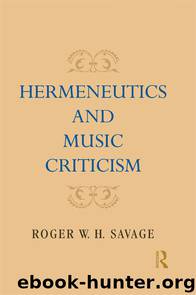Hermeneutics and Music Criticism by Savage Roger W. H

Author:Savage, Roger W. H.
Language: eng
Format: epub
Tags: Arts
Publisher: Taylor & Francis (CAM)
Published: 2009-07-21T16:00:00+00:00
7
MIMESIS AND THE HERMENEUTICS OF MUSIC
“Il y a certainement un art qui n’est pas mimétique, c’est la musique. Quoique, à la limite, ne pourrait-on pas dire qu’à chaque pièce d’art correspond un mood?”
(“There is certainly an art which is not mimetic, this is music. Although, at the limit, could not one say that to each piece of art there corresponds a mood?”)
Paul Ricoeur321
The contention that, of all the arts, music is the one that is not mimetic, finds its initial justification in the claim that mimesis is an action about action. Following Aristotle, Ricoeur maintains that mimesis is an activity that raises human action above itself. For him, “time becomes human to the extent that is articulated through a narrative mode, and narrative attains meaning when it becomes a condition of temporal existence.”322 Even more, the correlation between narrative activity and the temporal character of human experience “presents a transcultural form of necessity.”323 Exploring the meaning of human action in the realm of fiction transvalues ethical understandings of actions, characters, and events. Ultimately, “narratives have acting and suffering as their theme.”324 The fictive transformation of action and suffering, through the invention of stories that place everyday reality in suspense, effects the mimetic displacement of ethics to poetics. Correlatively, this mimetic displacement of praxis from the ethical to the poetic realm finds its completion in fiction’s refiguration of the practical field of our experiences.
My thesis that music is one, if not the, privileged mode of invention that we as human beings employ to refigure the meaning of time in the face of time’s inscrutability stands out against the limits of the narrative art. In fact, the notion that music refigures affective dimensions of our experiences marks out the horizon in which the question of music’s mimetic character appears in all its originality. Set against the backdrop of metaphor’s heuristic power, music’s exemplification of feelings and moods modulates the modalities of our inherence in the world. Feeling’s phenomenological objectivity anchors music’s creative imitations in its modulation of “states-of-mind” that open us to the world anew. That is, because feeling is phenomenologically objective, music’s imitation of moods is not simply subjective or emotive but is anchored in the fact that moods and feelings dispose us, as it were, to the world by attuning us to it. To the extent that the expression of a mood can become a poetic aim in itself, as Heidegger suggests, music’s capacity to affect us touches a fundamental element of our mortal dwelling. Hence in contrast to traditional mimetic theories of music, which take the problem of the truth of the representation as their key, I intend to follow Ricoeur’s theory of mimesis through to the point where the confession of narrative limits leads to the acknowledgment of other modes of discourse that in their own ways speak of time and the other of time.
The mediating role that plot plays in Ricoeur’s theory delineates narrative’s privileged relation to the time of action. This mediating role is decisive for the configuring activity that Ricoeur identifies with the poetic activity of emplotment.
Download
This site does not store any files on its server. We only index and link to content provided by other sites. Please contact the content providers to delete copyright contents if any and email us, we'll remove relevant links or contents immediately.
The Goal (Off-Campus #4) by Elle Kennedy(13651)
Kathy Andrews Collection by Kathy Andrews(11810)
Diary of a Player by Brad Paisley(7557)
Assassin’s Fate by Robin Hobb(6197)
What Does This Button Do? by Bruce Dickinson(6194)
Big Little Lies by Liane Moriarty(5790)
Altered Sensations by David Pantalony(5093)
Pale Blue Dot by Carl Sagan(4995)
Sticky Fingers by Joe Hagan(4188)
The Death of the Heart by Elizabeth Bowen(3605)
The Heroin Diaries by Nikki Sixx(3543)
Beneath These Shadows by Meghan March(3298)
Confessions of a Video Vixen by Karrine Steffans(3297)
How Music Works by David Byrne(3257)
The Help by Kathryn Stockett(3139)
Jam by Jam (epub)(3071)
Harry Potter 4 - Harry Potter and The Goblet of Fire by J.K.Rowling(3057)
Computational Linguistics and Intelligent Text Processing: 20th International Conference, CICLing 2019 La Rochelle, France, April 7â13, 2019 Revised Selected Papers, Part I by Alexander Gelbukh(2978)
Strange Fascination: David Bowie: The Definitive Story by David Buckley(2856)
